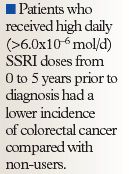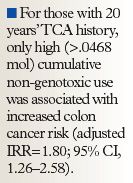- Safety & Recalls
- Regulatory Updates
- Drug Coverage
- COPD
- Cardiovascular
- Obstetrics-Gynecology & Women's Health
- Ophthalmology
- Clinical Pharmacology
- Pediatrics
- Urology
- Pharmacy
- Idiopathic Pulmonary Fibrosis
- Diabetes and Endocrinology
- Allergy, Immunology, and ENT
- Musculoskeletal/Rheumatology
- Respiratory
- Psychiatry and Behavioral Health
- Dermatology
- Oncology
SSRIs demonstrate risk reduction for colorectal tumors dependent on dose level in case-control study
Investigators conducting a population-based, nested case-control study observed an association between the daily dose level of selective serotonin reuptake inhibitors (SSRIs) and a decreased risk of colorectal cancer among patients aged 5 to 85 years old. No consistent association was found between colorectal cancer risk and the use of tricyclic antidepressants (TCAs).

"SSRI use might inhibit the growth of colorectal tumors through an anti-promoter effect or direct cytotoxic effect," the authors stated in an article published in Lancet Oncology. "Further investigation is needed, with more complete assessment of confounders such as lifestyle factors, use of drugs, and comorbidity that might affect the occurrence of colorectal cancer."

The SSRI population consisted of 3,367 cases and 13,468 controls, and for TCAs it was 6,544 cases and 26,176 controls. Patients who received high daily (>6.0x10–6 mol/d) SSRI doses from 0 to 5 years prior to diagnosis had a lower incidence of colorectal cancer compared with non-users (adjusted incidence rate ratio [IRR]=0.70; 95% CI, 0.50–0.96; P=.0172). No significant trend was identified for SSRI use from 6 to 10 years prior to diagnosis in patients who received either high or low daily doses.
For those with 20 years' TCA history, only high (>.0468 mol) cumulative non-genotoxic use was associated with increased colon cancer risk (adjusted IRR=1.80; 95% CI, 1.26–2.58). No other significant association between risk of colorectal cancer and use of TCAs was observed.
"Our data do not lend support to the hypothesis that tricyclic antidepressants increase the risk of colorectal cancer," the authors stated. "The lack of consistent associations and absence of dose-response effect make the significant incidence-rate ratios we recorded a likely result of random fluctuation in a situation of multiple comparisons."
A potential detection bias and certain confounding risk factors such as smoking, obesity, sedentary lifestyle, and excessive energy intake may have affected the study results. Other study limitations include that patients could have received both SSRIs and TCAs. Certain comorbidities such as diabetes and a lack of available data on the use of over-the-counter ibuprofen and aspirin also may have been confounders.
In an editorial accompanying publication of the article, Henrik Toft SØrensen, MD, of the Aarhaus University Hospital's Department of Clinical Epidemiology, noted that decades are necessary to accumulate chemoprevention data; however, adenoma data may expedite research. "Because adenomas are more prevalent than colorectal cancer and have a shorter induction period, trials designed to prevent adenomas can be accomplished more quickly and with smaller sample sizes than chemopreventive trials of colorectal cancer," Dr SØrensen stated. "Any effect noted in the early adenoma phase of carcinogenesis can be extrapolated to a later cancer effect."
Although the data removed confounders such as NSAIDs, according to Dr SØrensen, other confounding factors may still have existed. "Data from the study by Xu and colleagues provide interesting insights, but until trial data are available, clinicians should not consider SSRI use solely for chemopreventive purposes," Dr SØrensen said.
SOURCES Xu W, Tamim H, Shapiro S, Stang MR, Collet J-P. Use of antidepressants and risk of colorectal cancer: a nested case-control study. Lancet Oncol. 2006;7:301–308.
SØrensen HT. Selective serotonin-reuptake inhibitors and chemoprevention of colorectal cancer. Lancet Oncol. 2006;7:277–279.
